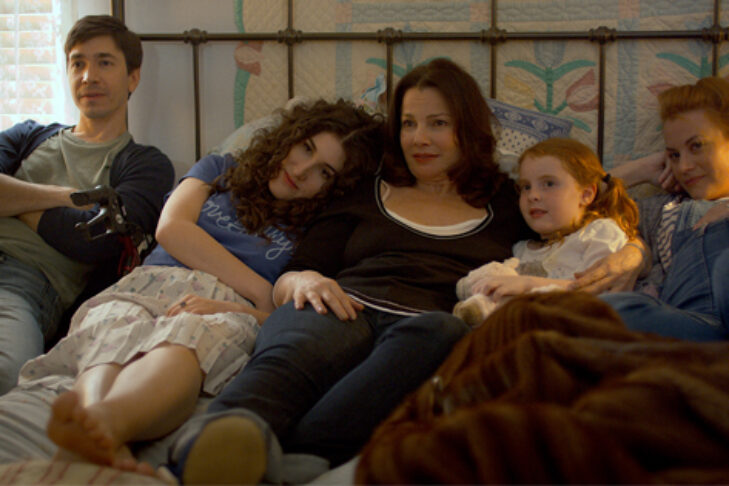Daniel Schechter’s latest film, “Safe Spaces,” opens the 31st Annual Boston Jewish Film Festival on Wednesday, Nov. 6. The film had its premiere last spring at the Tribeca Film Festival.
As the film’s title indicates, the debate over what constitutes a “safe space” is front and center. Although “safe spaces” are most often associated with college campuses, Schechter’s film expands the notion of what constitutes a safe space in life.
Within the film’s context, a safe space is an area in which someone can express an opinion without fear of judgment or retribution. Thirty-eight-year-old Josh Cohen, played by Justin Long, is a struggling playwright who tries to pay his rent by teaching creative writing as an adjunct professor at a school resembling City University of New York. New to teaching, Josh is passionate about what he does. One day in a burst of enthusiasm, he pushes—Josh might say inspires—a student to reveal a sexual encounter for the sake of art. “Embarrass yourself, Sarah,” he says. “Write what hurts.”
Sarah divulges the incident, and the class lauds her for her honesty. Later on, Josh finds out that Sarah’s confession triggered another student who is a sexual assault victim. Even as the scene is unfolding in real time, it’s inevitable that Josh will be censured.
Schechter told The Hollywood Reporter he did not intend for his film to be controversial. The film, he noted, reflects the current environment: “I think the #MeToo movement started happening, and I kind of started thinking any opportunity to maybe make an environment feel a little safer probably isn’t a preposterous thing to consider at all. And I think the movie tries to offer the benefits of that, and the potential dangers of that going too far. [It’s] trying to walk a fine line of nuance.”
Attempts at nuance, particularly in the college scenes, don’t always work. In Josh’s literature seminar, two white male students take issue with a black female student who assails them as the patriarchy. It’s anything but a subtle moment where Josh has lost control of the class. If anyone has a point to make, it gets lost in the unwieldy scene. When he appears before his department chair and the dean of students, who meekly notes, “Some of these students can be very sensitive.” He’s already defeated. It’s a moment that awkwardly begs the question of just how far political correctness has infiltrated academia.
For his part, Schechter, who loosely based the film on his own college teaching career, said in another interview with The New York Daily News: “There’s a typical response that a lot of people have that students in college shouldn’t be coddled, because this is an environment they should be challenged in. The whole world isn’t going to be a safe space.” Schechter admitted he felt the same way until the #MeToo movement gathered traction. The movement made him aware of the importance of creating a safe environment for all students.
Josh’s living situation is another part of his life that deteriorates into an unsafe space. He can’t cover the rent, and his sister takes over his place after she has a blowup with her boyfriend over sex. Josh’s lover, who temporarily lives with him, borders on abusive and is oblivious to his situation. It’s a precarious, often perilous environment for Josh.
The more engaging moments in the film happen in the hospital room where Josh’s beloved grandmother, the family matriarch, is dying. In contrast to Josh’s classroom, her hospital room is a safe, warm space for the family to gather and share memories. Compassion abounds there.
The Cohens are an eccentric lot, but in spite of themselves, they are a close-knit family. They conjure that other Jewish family, the Pfeffermans of “Transparent.” In “Safe Spaces,” Fran Drescher (of “The Nanny” fame) gives a noteworthy performance as Josh’s neurotic mother. Despite their faults, Josh’s crusty siblings, Jackie and David, rally around their grandmother and in the process bond together. The family’s estranged father, played by Richard Schiff (Toby in “The West Wing”), comes through to visit his mother-in-law, who was a second mother to him. For a brief moment, all is well.
At the end of the film, a great-granddaughter presents an endearing story of her great-grandmother’s escape from Eastern Europe. We see in the end that campus politics doesn’t mix so well with family drama. The valuable lessons learned here—which include an opportunity to confront hard truths—occur outside of the classroom.
The opening night screening on Nov. 6 at Coolidge Corner Theatre will be followed by a conversation with actor Justin Long and director Daniel Schechter. Find more information here.



